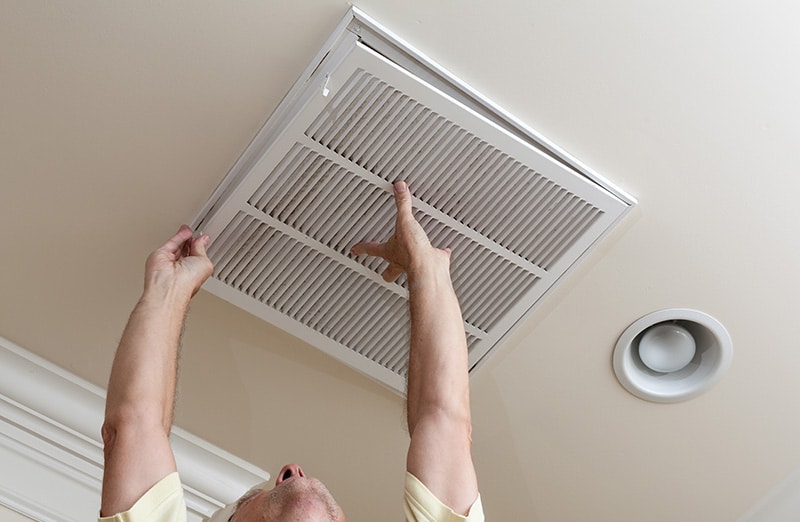Indoor air quality is an important consideration in work productivity and efficiency. Poor air quality can slow office workers down, making them feel sick, tired, or unable to think clearly. Ventilation is hard to come by during the winter, when office windows and doors are closed to protect employees from the frigid Massachusetts air.
Here’s what employers should know about toxic office air in the winter and they can do about it.

Why Indoor Air Is More Toxic in the Winter
Winter conditions in Boston are unavoidable. Storms pass through, snow and ice coat the ground, and you patiently wait for the sun to shine again. Meanwhile, employers are turning up the thermostat in their office, stoking a pellet stove, and maybe even utilizing space heaters on very cold days.
Employees may also be lighting scented candles, using air fresheners, and applying household cleaners to surfaces. While seemingly normal, each of these introduces harmful pollutants into your office air.
The most common indoor pollutants are classified below:
- Chemicals. Chemicals contained in cleaning sprays, glue, paint, pesticides, tobacco smoke, etc. pollute office air, often causing health issues that seem unrelated to air quality.
- Toxic gases. Carbon monoxide, radon, ozone, Volatile Organic Compounds (VOCs), formaldehyde, and nitrogen oxide can build up indoors without adequate ventilation via open windows or air conditioning.
- Dust mites and other allergens. Dust, lead particles, pollen, viruses, bacteria, mold, and fungi can be released into the air in office spaces, causing symptoms like runny nose, cough, and other allergic reactions.
Ways to Detect Poor Office Air Quality
Visually Inspect HVAC Equipment
Employers should regularly inspect their office building’s HVAC system for potential issues that could contribute to poor quality air. Issues to check for include but are not limited to:
Employers should look for:
- Wires that have been burnt or damaged
- Debris or rust in the drain pan
- Debris surrounding the outdoor condenser
- Accumulation of dust or particulates in the air vents
- External damage to equipment
Call for Preventative Maintenance
In particular, inadequate HVAC maintenance is a primary cause of poor indoor air quality. Preventative heating maintenance safeguards a company’s HVAC system while simultaneously improving the quality of air office employees breathe every day. When an HVAC system receives an inspection or tune-up, the entire system is thoroughly examined to ensure proper operation.
Contaminant sources like leaky ducts and poor ventilation are identified and repaired by experienced HVAC technicians. Preventative maintenance is recommended in the fall prior to the start of heating season and again in the spring prior to cooling season.
Install an Air Sensing Device
Using air sensing devices in conjunction with a building’s HVAC system to optimize air quality can help automate the improvement of your office air. These sensors determine if your workplace is crowded by detecting how much carbon dioxide is present in the surrounding air.
The building’s HVAC system is then turned on and off as needed, in turn improving indoor air quality and decreasing energy waste.
Ways to Improve Air Quality in an Office in Winter
Create and Enforce Sick Policies in the Workplace
Despite a global pandemic, many employees continue to report to work when they are unwell for a variety of reasons. Naturally, there’s higher incidence of illness in the winter when it’s easier for viruses to spread. As a result, it’s important for employers to ensure that their offices have sick policies in place to mitigate disease.
Employers should consider work-from-home alternatives for office employees who are sick. They should make sure staff understand that if they are genuinely ill, they should stay at home. They should also offer robust sick leave and/or paid time off so employees aren’t compelled to come into work sick to meet their financial obligations.
Invest in Humidifiers
Winter air in Massachusetts is often quite dry, resulting in a reduced amount of interior moisture. Allergens, germs, and viruses are transmitted more easily in dry air compared to air with a greater degree of humidity.
As a result, office employees are more likely to become unwell. Humidification technology can add moisture to office building air, making it easier to keep relative humidity between 30% and 50% during colder months.
Keep Air Moving Indoors
Almost all houses have windows and other structural features that help to let fresh air in. During the winter, however, it is typically difficult to open the windows or doors to allow air to circulate without the temperature dropping below what is comfortable.
Often, whole-house fans are used to move air through the HVAC system without heating or cooling it. These devices, when used as indicated, significantly improve ventilation in an office space. Portable fans can be used to improve air circulation in rooms or cubicles.
Use Air Filters or Purifiers
To remove pollutants in your work environment, you can choose from a variety of portable air purifiers. Many can effectively remove 99% of particles such as viruses, bacteria, and allergens. For healthier office air, companies may want to consider installing a whole-building air filtration system or utilize personal air purifiers throughout the organization.
Get Better Office Air Today with HVAC Service from N.E.T.R., Inc.
Good air quality isn’t something employers want to compromise on. At first, many businesses don’t understand how impactful indoor ventilation can be. Over time, however, employers often realize that stuffy office air can make work come to a grinding halt.
At N.E.T.R. Inc., we understand the importance of breathing quality air for both commercial businesses and homeowners. We can help you determine if you should improve the condition of your air and develop a strategy to eliminate indoor pollution, increase humidity and ventilation, and increase the overall quality of your air.
Contact us today to learn more or to schedule an in-person visit with one of our HVAC technicians by dialing (781) 933-6387.

